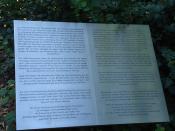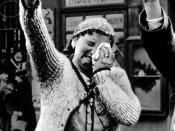A public library which provides free and open access to information and differing points of view, is an essential component of an open society. To be an open society people need to feel safe expressing different viewpoints. A public library should be a place where someone regardless of race, age, wealth or beliefs can have open access to information and feel safe doing so. The main role of a public library in an open society is to uphold this ideal.
What is an open society?
The concept of an 'open society' was first originated by philosopher Henri Bergson and then popularized by Karl Popper. Born in Austria to parents of Jewish origins, Popper's childhood watching the rise of Nazism and his teenage experimentation with Marxism influenced his later writings. He wrote his 1945 book "The Open Society and Its Enemies" while in exile in New Zealand during World War Two.
Popper believed that "nobody has access to the ultimate truth; our understanding of the world is imperfect, and a perfect society is unattainable." Therefore, he hypothesized, the best option is an open society-a society that realises its politics is imperfect but it is open for continual improvement and new ideas. In an open society a plurality of viewpoints and ideas are valued and encouraged. The opposite of an open society is a closed society that believes its way of doing things is the best and only way and is not open to criticism or a different way of doing things.
A democracy is not automatically an open society. However, a democracy as we know it in the modern western world is probably the closest thing to an open society we have. In the words of Winston Churchill:
"Many forms of Government have been tried, and will be tried in...


